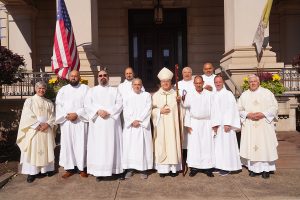SCRANTON – Eight men in formation to become permanent deacons of the Diocese of Scranton were instituted in the Ministry of Acolyte during a special Mass at the Cathedral of Saint Peter on Oct. 19, 2024.

The Ministry of Acolyte includes assisting the priest and deacon at the altar during Mass. Acolytes serve during liturgies, help distribute Holy Communion and purify sacred vessels. Installation to this ministry marks the final step before ordination to the permanent diaconate, which will take place for this class Nov. 29, 2025.
“With each year, it gets more and more serious,” Fernando Alves of Saint Luke Parish in Stroudsburg, said. “We feel blessed to be here. It is a great responsibility to be able to serve the Church and our community.”
In addition to Alves, the seven others instituted as acolytes included: Francisco Castelan of Saint Teresa of Calcutta Parish, Scranton; Michaelangelo Colaneri of the Cathedral of Saint Peter, Scranton; Frank Fanelli of Saint Ann Parish, Shohola; Joel Marte, Jorge Roca and Rafael Sánchez Velásquez, all of Saint Matthew Parish, East Stroudsburg; and Christian Saunders of Saint Paul Parish, Scranton.
“It’s a real honor to be able to walk in this path,” Saunders stated. “I’ve found it really fulfilling and I’m really excited about serving.”
The Most Rev. Joseph C. Bambera, Bishop of Scranton, who served as principal celebrant and homilist at the Rite of Acolyte Mass, discussed the importance of walking with Jesus as they continue their final preparation in the Permanent Diaconate Formation Program.
“Walk with Jesus through these challenging and polarizing days in which we find ourselves and know that you do not journey alone,” Bishop Bambera said. “Share the gift of Jesus in the Eucharist generously and so become Christ for one another in the sharing.”
After retiring as a detective in the New York City Police Department, Fanelli found himself called to serve the Church in a greater way after settling in the Pocono Mountains. He has been humbled to be able to help the three parishes in his community serve hundreds of free meals each month.
“I just want to continue helping people,” Fanelli said about his preparation to become a deacon. “It is a lot of work, but the rewards are incredible.”
This permanent diaconate class is historic because it will mark the first time the program has both English and Spanish-speaking candidates learning together at the same time.
Using technology, the men have spent several years of discernment and study together despite language differences.
“I’m very happy and overwhelmed and joyful about the Institution of Acolyte,” Roca said in Spanish. “I know that it comes with a big responsibility, and I am trusting in the Lord that I am prepared.”
